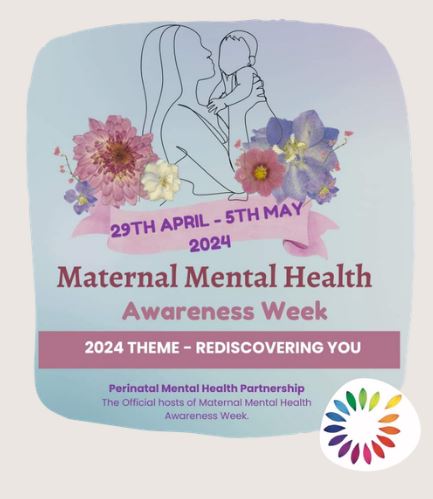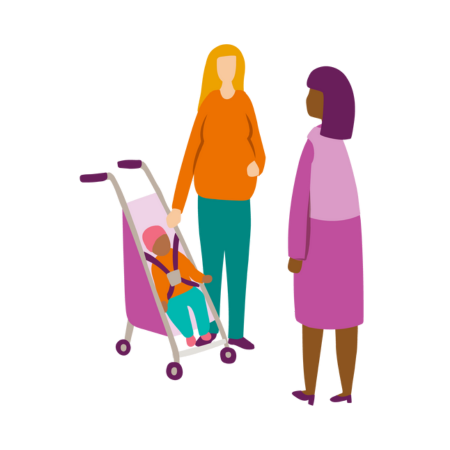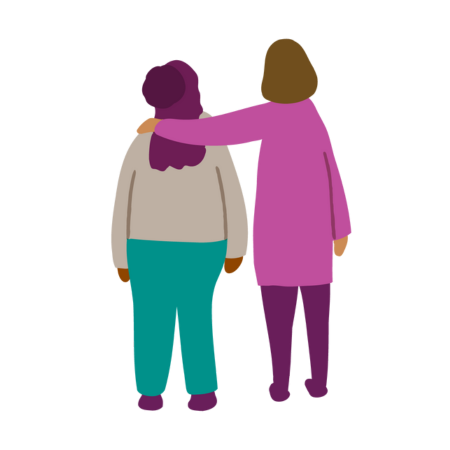What is Maternal Mental Health Awareness Week?
Maternal Mental Health Awareness Week is a week-long campaign dedicated to talking about mental health problems before, during and after pregnancy.
The week is all about:
- raising public and professional awareness of perinatal mental health problems
- advocating for women and families impacted
- changing attitudes
- helping people access the information, care and support they need to recover.
Counting the costs
- 1 in 5 develop a mental illness during pregnancy or first postnatal year
- £8.1 billion known costs of perinatal mental health problems per year’s births in the UK.
- Suicide is a leading cause of maternal death during pregnancy and the first postnatal year
Who is it organised by?
The week is organised and led by MMHA member Perinatal Mental Health Partnership UK (PMHP UK), who launched the first-ever UK Maternal Mental Health Awareness Week in 2017.
PMHP UK is a small group of individuals, including parents with lived experience and clinicians, who came together to raise awareness of maternal mental health.
Daily themes for 2024
- Monday 29 April – Demystifying perinatal mental illness
- Tuesday 30 April – Moving together through your changing world
- Wednesday 1 May – World Maternal Mental Health Day – Stronger together
- Thursday 2 May – Finding you in this journey: identity transformation in the perinatal period
- Friday 3 May – Perinatal positivity pot: shining a light on parent voices and recovery stories
- Saturday 4 May – Support for all: sharing empowering resources for all families in the UK and beyond
- Sunday 5 May – Reflections on rediscovery: looking back over the week
What to do if you or someone you know is unwell.
Mental health problems during and after pregnancy are common. Some women have a previous mental health condition that can be exacerbated by pregnancy or having a baby. For others, they may experience a mental health problem for the very first time.
Whatever your situation, please remember that health professionals such as GPs, midwives, health visitors and mental health services are available to help you. Please don’t delay calling them if you are concerned about symptoms.
How do I know what’s normal?
1) Know the warning signs
How do I know what’s “normal”? from Best Beginnings
There are different perinatal mental health problems with differing symptoms, and you or a loved one may not even realise that what you’re experiencing could be an illness. To help you spot signs that you or a loved one may need help, please consider the following questions:
1. Do you/they have new feelings and thoughts which you/they have never had before, and which make you/them disturbed or anxious?
2. Are you/they experiencing thoughts of suicide or harming yourself/themselves in violent ways?
3. Are you/they thinking they are a bad mum, as though you/they can’t cope, or feeling disconnected from the baby?
4. Do you feel you/they are getting worse?
If you or a loved one answer(s) ‘Yes’ to any of the above, please contact one of the support services below and get the professional help you need.
2) Get support
If you are concerned about your mental health, or the mental health of someone you know, it is important to either:
- Talk to a health professional, such as a GP, midwife, health visitor or therapy service
- Go to A&E at your local hospital
- Call the Samaritans on 116 123 (free to call and will not appear on your phone bill), or email jo@samaritans.org
- Call Lifeline (Northern Ireland only) on 0808 808 8000 (free of charge)
- Access mental health services
3) Find more information and support
Mental health support
There are lots of organisations that offer mental health support to new and expectant parents.
You can refer yourself directly to free NHS therapy/counselling services in England or be referred through your GP in Wales, Scotland and Northern Ireland. In England, these services will prioritise women in pregnancy and postnatally.
There is also a directory of private counsellors working online or offering telephone counselling.
How to help others with mental health problems.
4) Always remember expert help is available
The really good news is that we know how to treat mental health conditions during pregnancy or after birth. It is important to speak out as early as possible if you or your loved one have any symptoms that concern you, and it’s best to get treated early.
You or others that care for you may be concerned about speaking out, but there are specialist perinatal mental health teams in parts of the UK who are uniquely trained to support a mother’s recovery from perinatal mental health problems, with her baby.
Please remember that speaking out is a sign of strength and a way of looking after yourself, which in turn will help take care of your baby.
Find out more here
Urgent support
If you are in crisis, despairing or suicidal, please talk to a healthcare professional immediately. This could be a GP, midwife or health visitor, for example.
Or, you can:
- Go to A&E at your nearest hospital
- Find a local NHS urgent mental health helpline (England only)
- Call Samaritans on 116 123 or email jo@samaritans.org.
You are not alone. Mental health problems during and after pregnancy are common and help is available:





